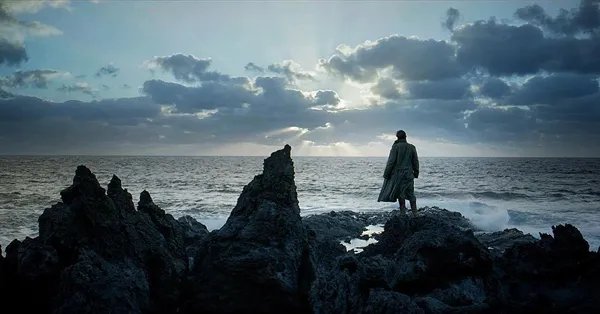 |
| "Ocean is more ancient than the mountains, and freighted with the memories and the dreams of Time" - HP Lovecraft |
A remote island. A solitary weather observer. A devastating secret. Xavier Gens’ Cold Skin has enraptured horror audiences around the world, pleasing fans of the book on which it’s based and also fans of HP Lovecraft, whose work was a big influence upon it. David Oakes plays the unnamed man who agrees to be marooned there and who only survives thanks to the help of surly lighthouse keeper Gruner (Ray Stevenson), but whose encounters with the monstrous beings who emerge from the sea at night take him to some unexpected places. Despite the disturbing nature of the story, David reports that he had a wonderful time filming it, and he’s happy to talk about the experience.
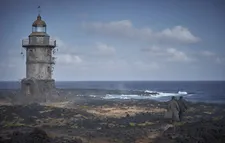 |
| Exploring the island |
“I hadn’t read the book,” he says, noting that he didn’t speak Catalan and prefers to read things in the original language. “I had read quite a bit of Lovecraft as a kid. I really warmed to Xavier’s interpretation of it, the fact that they were using the book as a starting point and then he was going off in his own direction. I think the novel perhaps doesn’t have the same sort of feminist agenda that our film does. Ours is a little less kind to mankind, if you will.”
Did adapting the film from a book help when it came to the narration which frames the story?
“We spent quite a lot of time in Madrid on prep, myself, Ray and Xav, going through the book and finding parts of the first person narration in the novel that would lend themselves very well to the film. Most of the narration that you have on the film is a direct lift from the translation of the novel.”
So did he get the opportunity to contribute to the way his character was scripted?
“Yeah, amazingly so, actually. Considering that I was only on board for about two months before we started principal photography, it was amazing. All of the producers and the writers were very keen to allow my personal input, so all of the Keats poetry that pops up all over the place, that’s very much David Oakes’, and a lot of the terminology all the way through, lots of different bits of philosophy that we play with, were things we brought in. There were maybe ten, 20 hours spent sitting round a table just playing with ideas that could make the metaphysical elements of the narrative work a little bit better.
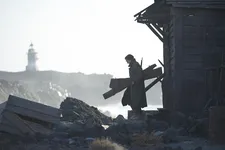 |
| Settling in |
“The narration, obviously, is retrospective, so it was nice to know where he was going to end up but then, because he starts with absolutely no understanding of what’s on the island, it was quite straightforward really. You know nothing, you’re on an island and you know where you’ve got to end up, so as long as you plot that course carefully you shouldn’t run into any trouble with it.”
Did he think much about where his character had come from, to be in that situation?
“In the British translation of the book it isn’t really mentioned at all, but in the original Catalan he’s an Irishman who’s escaping Ireland, mainly as a conscientious objector. I never made a specific choice about what he was fleeing – I didn’t think it was necessary – but there’s obviously the war that’s about to kick off in Europe which he’s hiding from and I overlaid that with a personal trauma that he might have gone through, some sort of romantic act, for a nice parallel with what Gruner is going through, but because it was never referenced in the film if it was never necessary to know exactly what it was. I think when you run away to escape something you do exactly that; you turn your back on it and you try not to think about it at all.”
Did he want to make his character sympathetic or leave the audience a little unsettled by him?
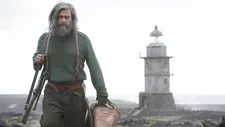 |
| The lighthouse keeper |
“I think an actor’s always guilty of wanting the audience to respect the character he’s playing,” he admits. “It’s an interesting one. You never know his name, so that was always a tough one. He’s also a bit priggish in the beginning. I wanted people to go on a journey with him. I wanted them to discover information when he discovered it, so as you you come to understand the rules of that island, so does the character. If people liked him or disliked him... I just wanted him to do something. At first he’s just reacting to situations on the island. It’s only after the first third that he actually gets to do something proactive, and then I hope people can start to relate to him.
“I absolutely loved the idea that we had a film that had very little dialogue and was represented by two contrasting characters. I think, unlike the majority of films being made these days, the audience is forced to fill in the gaps with their imagination, and a projected sense of characters. I think [my character and Gruner] are different sides of the exact same coin. I think that’s the point of the movie: it’s that inevitability of circumstance to which humanity can be drawn, and then before you know it you’ve become what you hated and then the cycle starts again.”
It’s a very physical film for the actors – lots of outdoor work with heavy lifting. How did he find that?
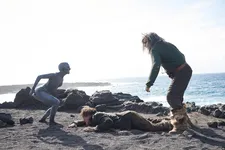 |
| Staking a claim |
“Where we were filming down in Lanzarote it was volcanic so we were walking across lava fields all the time, which was a pain in the ass, quite frankly! And we were filming six days a week so there wasn’t much time for let-up and it was night-time all the time, but I think it added a sense of character to the movie. You watch us struggling to walk around and that’s because that’s what it would have been like then.
“There was one decision that Xavier made in the sound design, from having filmed for nine weeks down in Lanzarote and having the roaring, pounding ocean there all the time, he had this sensibility engrained into every scene that when he put it into the edit he didn’t see it anymore, couldn’t hear it, so when they reconstructed the sound of the ocean being a constant, he made sure that he put in the hours so it would be a constant, very present rumbling, which is what happens at that point in the sea when you’ve got all of the Atlantic buffeting into an island.
“I think the rough environment became a character in the movie. If you look at Daniel’s cinematography, those huge wide expanses of stunningly beautiful land are representative of what it was like to be there. It was beautiful.”
And what about all those water scenes? They must have been cold to film.
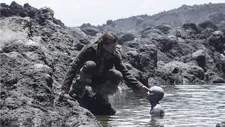 |
| In too deep? |
“During the daytime it was about 40 degrees [Celsius],” he says, laughing. “It was so hot! So the water was actually quite welcoming. When we were filming all the really cold Arctic stuff, wearing layers of fur and wool and... yeah, we were sweating pretty profusely.
“Originally they were thinking of shooting up in Iceland, but the reality of having all of the stuntmen in those costumes and prosthetics, they wouldn’t have been able to walk anywhere, they would have been far, far too cold. So the compromise was made that the actors pretending to be cold in the Arctic would be in the tropics and not the other way round.”
How did he adapt to the film’s period setting?
“The vast majority of my professional career has been doing period work so I think whether I like it or not my mind is wired to being slightly archaic, so it doesn’t take a huge amount of shift for me. I’m going to try to do contemporary stuff in the future! I think I’ve done enough period drama for a lifetime. Not that I don’t love it, it’s just time for a change, perhaps.”
As a fan of Lovecraft, which works did he feel were important to the film? The Shadow Over Innsmouth is the most directly referenced.
“Innsmouth is definitely the main one,” he agrees. “There’s a really dark graphic novel that Alan Moore created a few years back, called The Necronomicon, which is a sort of response piece to HP Lovecraft that I always had in my mind. Lovecraft is traumatising and odd and weird but it’s desexualised. The novel, of course – and our film – has put the sex back in, and it’s all about the guttural human nature of it, and Alan Moore’s Necronomicon does that in the extreme. I think it’s the themes that Lovecraft wanted to discuss in his books but was perhaps a little bit too prudish to do. He hid in his fantasy, whereas the fantasy that I enjoy extrapolates humanity into a fantastical setting.
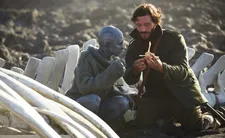 |
| Getting to know the natives |
“I think my character’s not afraid to adapt to his surroundings and evolve over the course of his year on the island. I think most of Lovecraft’s protagonists don’t change. They can be shocked and they can be terrified but they don’t necessarily change, whereas I think in modern anthropological discussions of the fantastic you have characters that are violently affected by these supernatural creatures that they encounter.”
Often in film, the better a piece of work is, the more the actors talk about misery and effort involved in making it. But despite acknowledging the toughness of the shoot, David clearly had a great time on set.
“I loved it. It was a chance to sit on an island and lose myself for a bit. I could just sit on a cliff top and look out over this huge, mysterious seascape, and it was magical. It was probably one of the happiest jobs I’ve ever done, which is saying something when you’re being attacked by hordes of frog monsters every night!”
Coming up – director Xavier Gens talks about the film and its themes.
Cold Skin is out on Digital HD on April 23 and DVD on April 30.





















